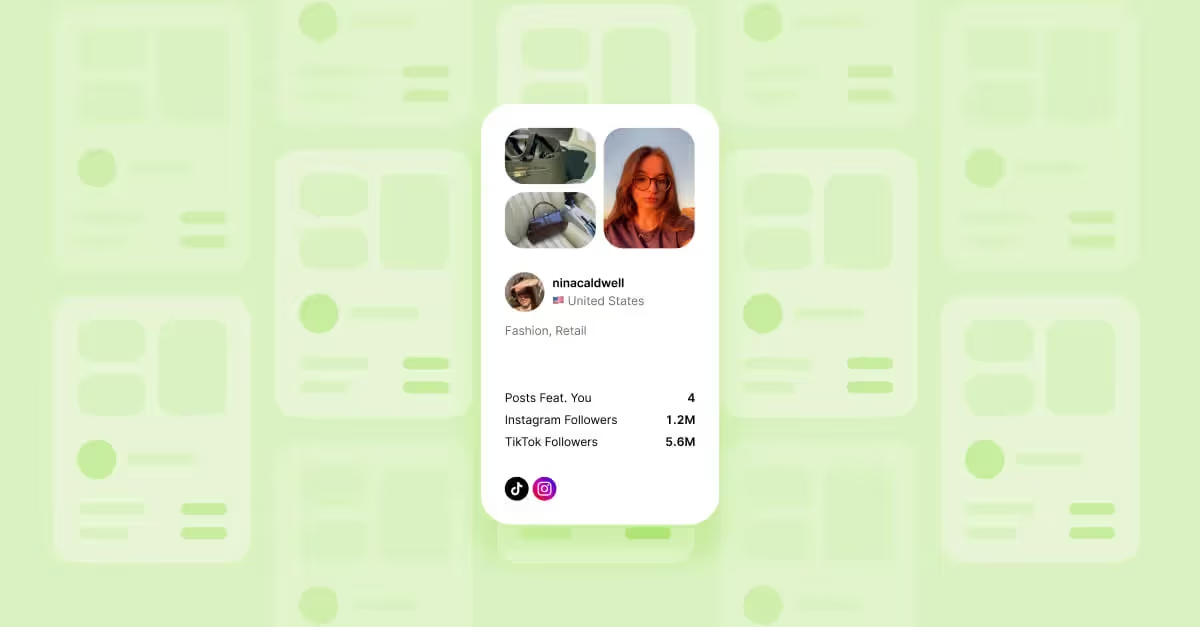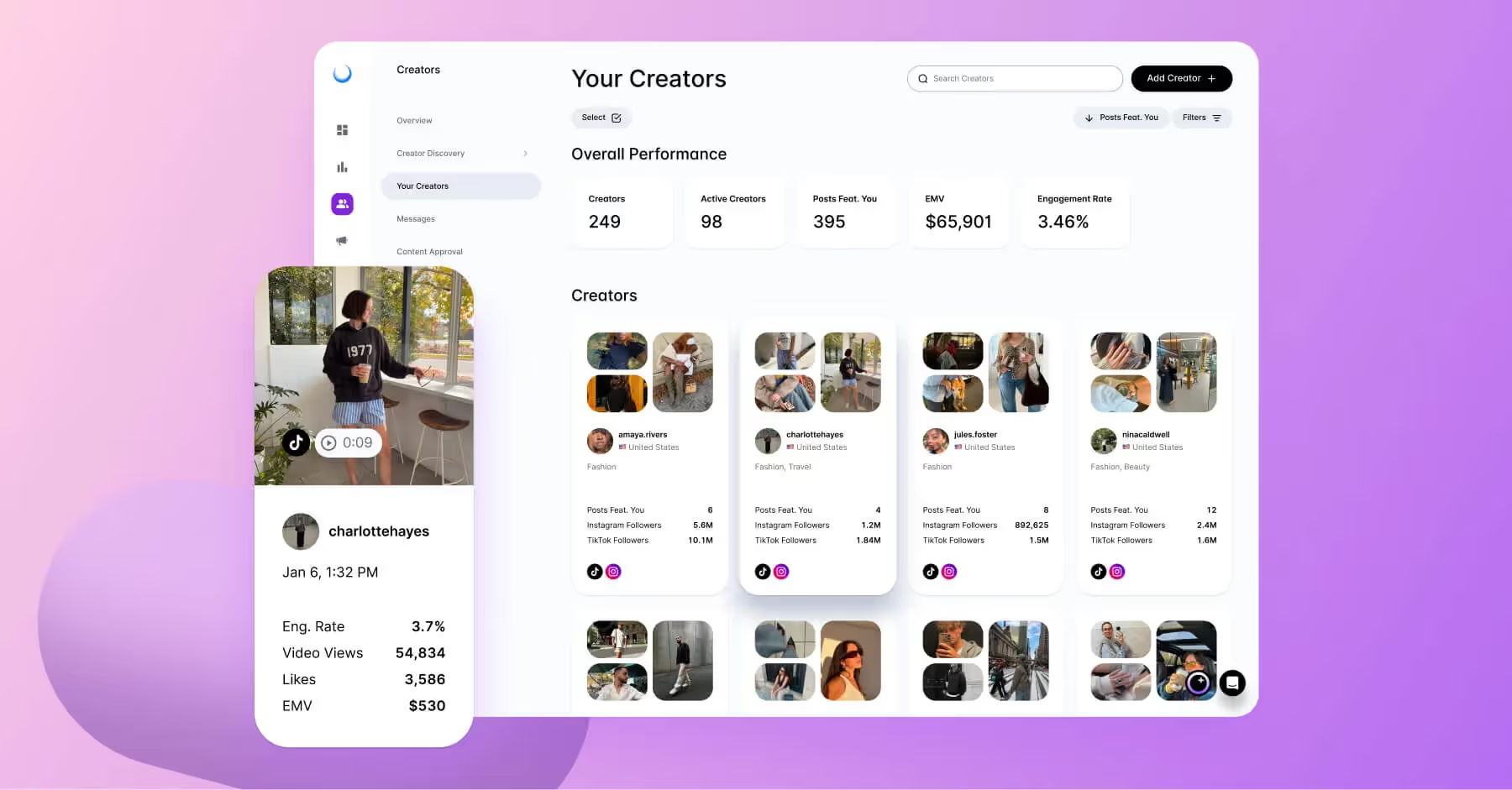Best 20 Influencer Marketing Platforms for Brands in 2026
Discover the 20 top influencer platforms to boost your brand's reach and impact in 2026.

Contents
What Are Influencer Marketing Platforms?Influencer Marketing Platforms Side-by-Side Comparison ChartTop 20 Influencer Marketing Platforms and Software 6 Benefits of an Influencer Marketing PlatformHow To Choose the Best Influencer Marketing Platform for Your BrandInfluencer Marketing Platform FAQsBrands and marketing teams are honing their influencer marketing strategies more and more each year. In fact, brands are increasing their influencer marketing spend, with organizations projected to invest $9.29 billion in influencer marketing in 2026. By 2028, 91.2% of marketers will be using influencers in some form.
With this increase in marketing spend and time, teams need influencer platforms to ensure they’re making the most of their efforts and getting a holistic picture of their influencer efforts with tools that aid in content creation, creator management and more. To help your search, we’ve rounded up some of the most popular influencer management platforms and carefully considered their pros, cons, and more. Which tool is right for you? Let’s find out.
TL;DR:
- Influencer marketing platforms help you find the right creators for your campaigns faster.
- Not all influencer platforms are created equal. Be sure to make a list of ‘must-haves’ you aren’t willing to compromise on.
- Look for a holistic platform that will help you do more than influencer marketing and integrate seamlessly into your current tech stack.
- Test and trial as many influencer marketing platforms as possible before making a decision.
What Are Influencer Marketing Platforms?
An influencer marketing platform is designed to help brands source, manage and measure creator and influencer marketing programs. These platforms automate and simplify many aspects of running influencer campaigns, like sourcing the right talent for a new campaign, setting goals, managing influencer contracts and, most importantly, post-campaign analysis.
While influencer marketing is a relatively new component of brand marketing strategies, 14% of global marketers expect to allocate 10-15% of their budgets towards influencer marketing in 2026. However, as the influencer marketing industry matures, it is becoming increasingly complex, with some brands managing thousands of creators with differing levels of partnership.
Influencer Marketing Platforms Side-by-Side Comparison Chart
With so many influencer marketing tools available, your perfect solution will tie into your overall goals and workflows. Here's an at-a-glance look at the most popular influencer marketing platforms to help you navigate the decision-making process.
Top 20 Influencer Marketing Platforms and Software
Managing an effective influencer relationship requires much more than simply sending over a contract. To fully understand the scope and impact, social teams need influencer marketing software that provides detailed analytics, performance management, and communication, preferably in one convenient tool.
In no particular order, here are some of the most popular influencer marketing platforms, along with our breakdown of their key features, pros, cons, pricing, and more.
1. Dash Social
Dash Social's Creator Management tool offers a comprehensive tool for brands to discover, collaborate, and track performance. With the Creator solution, brands can identify and reach out to potential influencers, manage their campaigns, and analyze the impact of their influencer marketing strategy from one central hub. What’s more, its intuitive and clean interface simplifies content approval, making communication seamless.
Curious which creators are making great UGC? What about help with sourcing influencers? Dash Social's Influencer and Creator ROI solutions help your social team source and manage influencer relationships (and the rest of your social strategy) from one convenient tool. Predict the potential performance of earned media and source trends with Visual IQ to make the most of all of your influencer content.
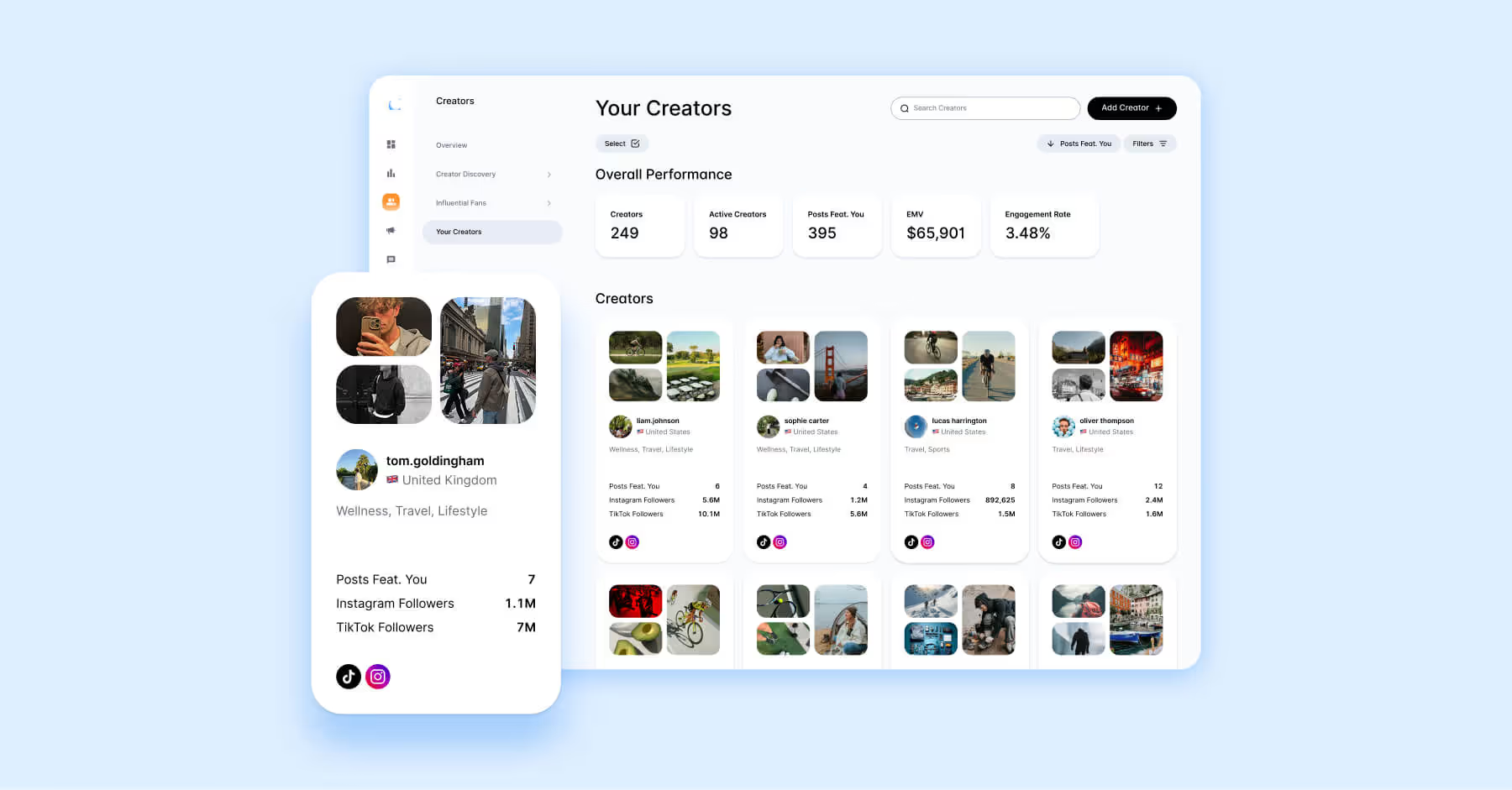
Key Features:
- Campaign optimization
- UGC management
- Contracts and payments
- Cross-channel analytics
- Performance predictions
Best Suited For: All Industries
Price Range: Custom Pricing
2. Influencity
Influencity is an influencer management tool designed to help brands and agencies find, analyze, and collaborate with influencers. It offers advanced analytics to provide insights into influencer performance, and a vast database to simplify the search process for the right partners. The platform also includes custom campaign tracking, so brands can monitor and optimize influencer strategies on Instagram, TikTok, and YouTube.

Key Features:
- Influencer recruitment
- Influencer scoring
- Audience analysis
Best Suited For: Fashion, Beauty Brands
Price Range: $318-$798 per month
3. Upfluence
Upfluence is a platform for influencer marketing that offers support for affiliate programs and partnerships from brand ambassadors to user-generated content (UGC). Upfluence’s platform offers features geared towards influencer discovery, influencer management, influencer payment, and overall campaign tracking. Additionally, they offer some free features for users, like a fake follower checker, which is perfect for small teams with a limited budget to spend on their tech stack.

Key Features:
- Influencer database
- Influencer segmentation
- Campaign analytics
Best Suited For: E-commerce, Technology
Price Rangme: Not public
4. GRIN
GRIN is an influencer marketing platform built specifically for e-commerce brands. The influencer platform has tools for brands to discover, recruit, and manage influencers. Built-in community management tools help teams streamline their workflows to grow relationships with their influencers and in turn, their audience. GRIN also offers automated email communication features to help make reaching out to influencers and keeping track of deadlines easy and efficient.

Key Features:
- Data importing and exporting
- Influencer collaboration
- UGC management
Best Suited For: Marketing, Finance, Developers
Price Range: Not public
5. LTK
LTK, formerly rewardStyle, is an influencer management tool meant to help brands and influencers collaborate. It allows influencers to easily monetize their content through affiliate links while also sharing a wide network of influencers for brands to source from. LTK helps simplify the process of finding and partnering with influencers and measures the success or failure of influencer-led campaigns. The platform also offers streamlined communication tools, which make it easy for brands and influencers to coordinate their tactics. What’s more, the platform offers helpful insights into consumer behavior to help teams hone their social commerce strategies.
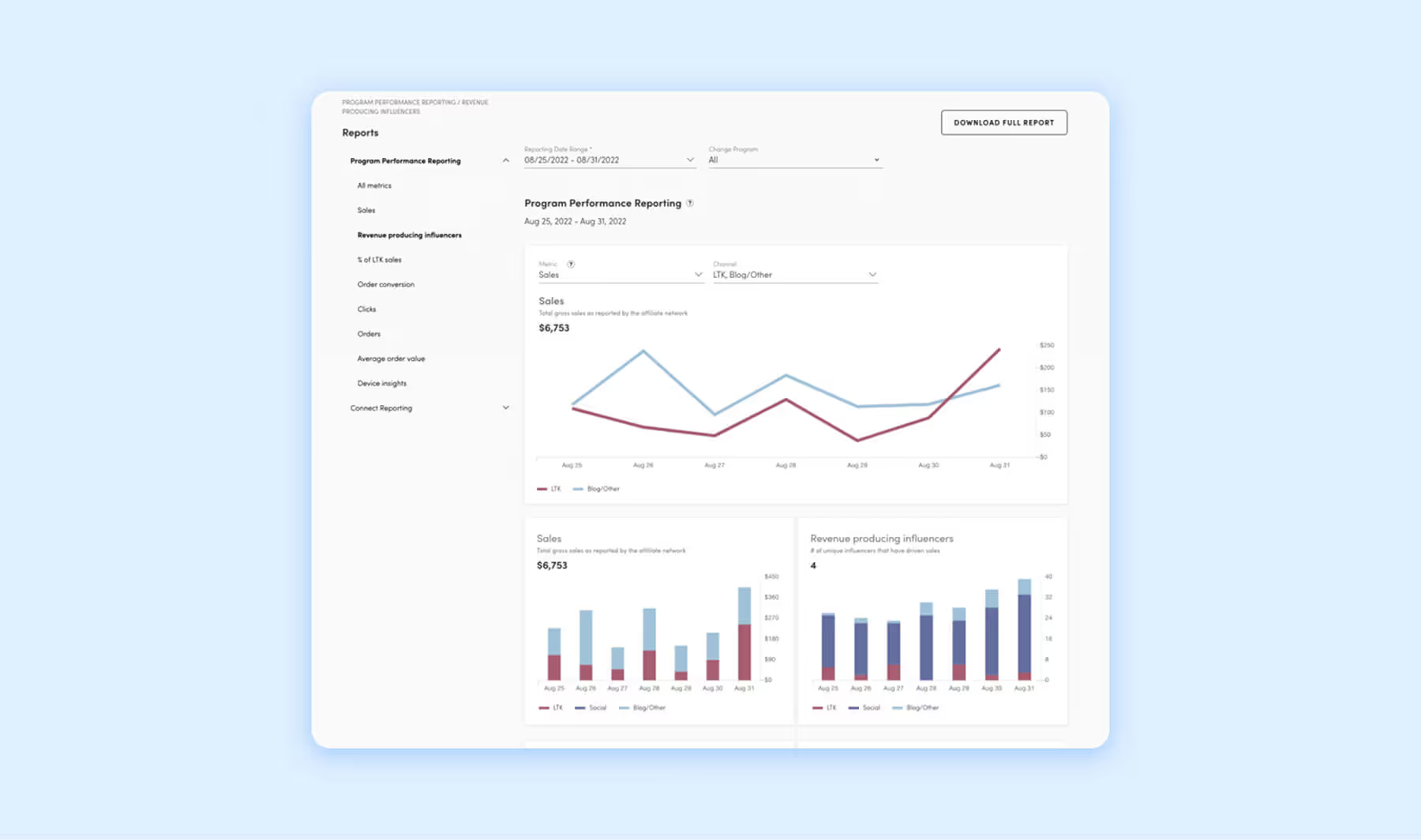
Key Features:
- Influencer whitelisting
- Reporting and dashboards
- Influencer scoring
Best Suited For: Fashion, Lifestyle
Price Range: Not public
6. Creator.Co
Creator.Co offers an all-in-one platform to scale influencer and affiliate marketing campaigns, including tools to discover, manage, and track influencers. Creator.Co specifically focuses on helping brands reach niche audiences through partnerships with small influencers to foster more meaningful engagement and authentic connections with a brand’s target social demographic, including influencer onboarding, so you ensure each influencer you work with knows what to expect, and has the tools they need to succeed. The platform also has reporting features like influencer discovery, Stories, and Reels reports, so brands can measure every areas of their campaign for a holistic look at their success.
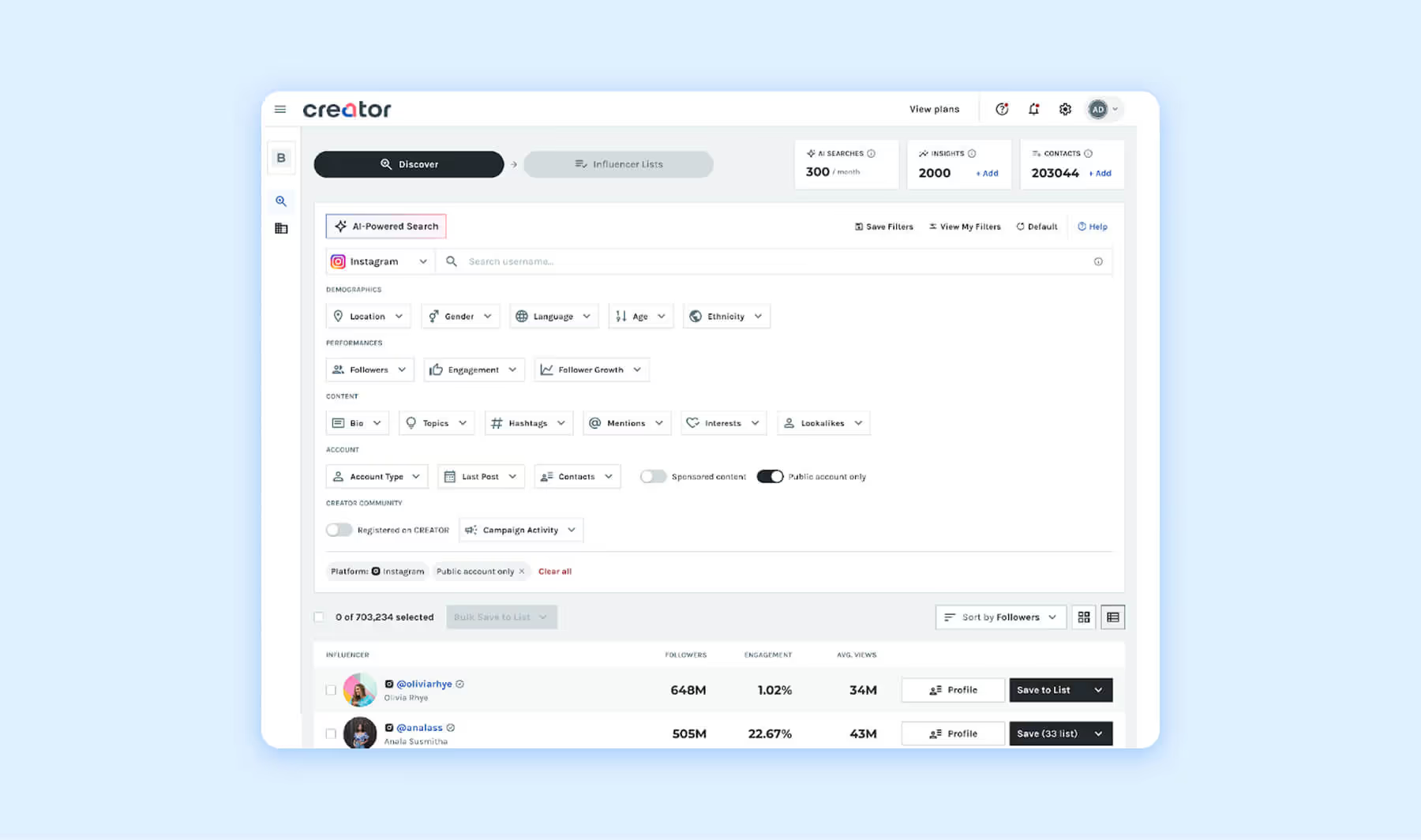
Key Features:
- Influencer recruitment
- Influencer scoring
- Influencer segmentation
Best Suited For: Beauty, Health and Wellness
Price Range: Starts at $995 per month
7. Ubiquitous
Ubiquitous allows you to streamline your influencer marketing process for brands and agencies. It offers features to discover influencers, manage campaigns, and analyze performance metrics. Ubiquitous has a user-friendly interface and advanced targeting abilities, which are helpful for brands to find the right influencers that suit their specific needs. The platform also supports efficient collaboration between teams, enhancing productivity, and campaign coordination.

Key Features:
- Campaign management
- Paid ad integration
- Influencer matching
Best Suited For: Fitness, Travel
Price Range: Not public
8. Viral Nation
Viral Nation provides brands with influencer marketing campaign solutions, like influencer discovery and campaign management, in a single platform. It is known for its extensive network of high-profile influencers and its ability to create unique strategies tailored to specific brand goals. Its analytics and reporting tools also help brands measure campaign effectiveness and make data-driven decisions.
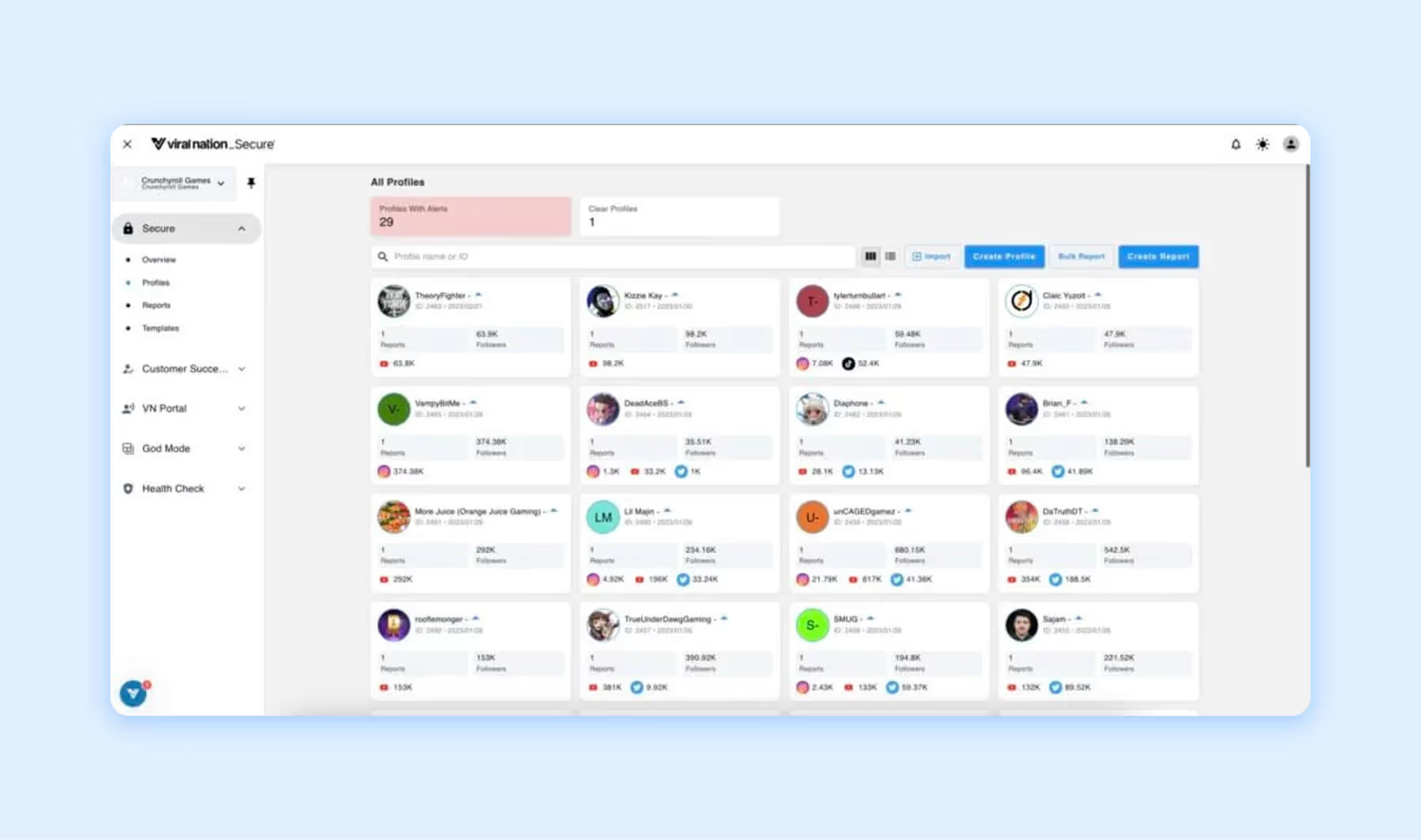
Key Features:
- Community management
- Creator vetting
- Advanced analytics
Best Suited For: Gaming, Entertainment
Price Range: Not public
9. Modash
Modash is designed to help brands discover and analyze creator collaborations across social media platforms. It offers both audience and influencer analytics tools to manage influencer relationships and campaigns. Modash offers in-depth reporting, although the interface is a touch less intuitive. This makes the platform a great option for brands who are mostly concerned with collecting data, and perhaps less with managing their overall influencer campaigns. With Modash, brands can also conduct a social media competitive analysis and benchmark their performance against competitors.

Key Features:
- Campaign management
- Influencer filtering
- Influencer insights
Best Suited For: Fashion, Fitness
Price Range: $199-$499 per month
10. Later Influence
Later Influence is an influencer marketing platform that helps brands streamline end-to-end campaigns. From finding and vetting influencers to managing their content, the platform helps brands incentivize their creators and track campaign performance all in one place. Later’s influencer discovery is AI-powered and helps you find creators you never would have otherwise. Overall, users praise the tool for its flexible workflows, affiliate link program, and real-time analytics.
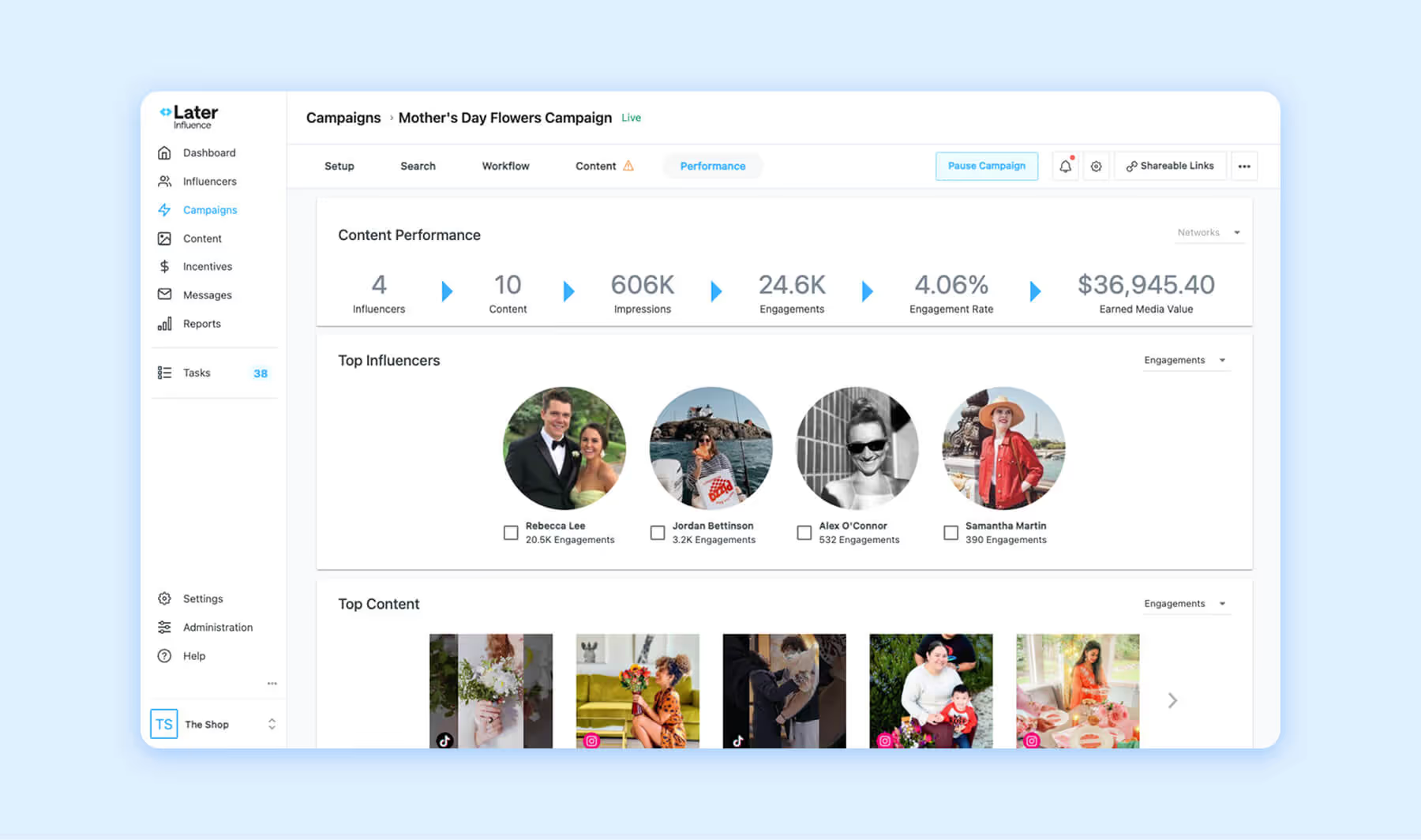
Key Features:
- Influencer recruitment
- Influencer collaboration
- Compensation and payments
Best Suited For: Enterprise, CPG brands
Price Range: Not public
11. Aspire.io
Aspire.io is a word-of-mouth commerce and influencer marketing platform that empowers brands to discover, collaborate with, and manage relationships with brand ambassadors, creators, and even their own customers. Aspire streamlines campaign automation, content creation from UGC, affiliate and promo-code tracking, and performance measurement. Users love that Aspire.io helps them drive ROI, build creative content and holistically manage influencer campaigns.

Key Features:
- UGC management
- E-commerce integration
- Audience analysis
Best Suited For: Agencies, Food and Beverage
Price Range: Not public
12. Meltwater
Meltwater is a comprehensive influencer platform (formerly known as Klear) that enables brands to seamlessly discover, vet, and engage with influencers. Its database houses over 30 million creator profiles and gives brands the ability to filter by real-time analytics like engagement rate or audience demographics like region, language, and more. Users enjoy that they can use Meltwater to tie their influencer marketing efforts into their broader social media stacks.
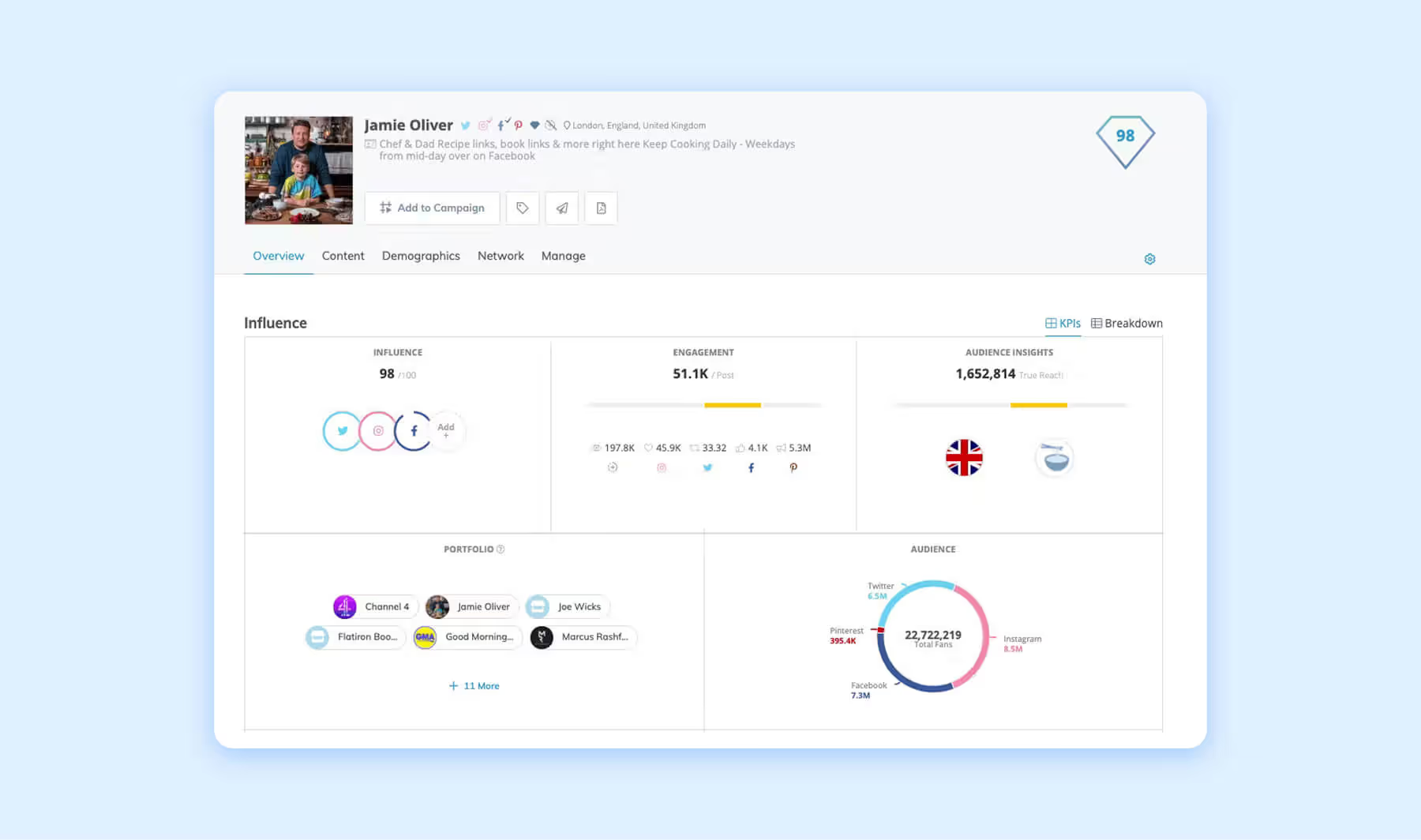
Key Features:
- Influencer scoring
- Influencer segmentation
- Campaign analytics
Best Suited For: Enterprise, Technology
Price Range: Not public
13. Brandwatch Influence
Brandwatch Influence offers a full influencer marketing suite. Users can discover and filter creators across their favorite platforms, such as TikTok, Instagram, and more. Manage relationships, store contacts and contracts, keep track of email correspondence, and create custom data fields all within Brandwatch Influence. Features like content approvals and payment processing are especially enjoyed by users.
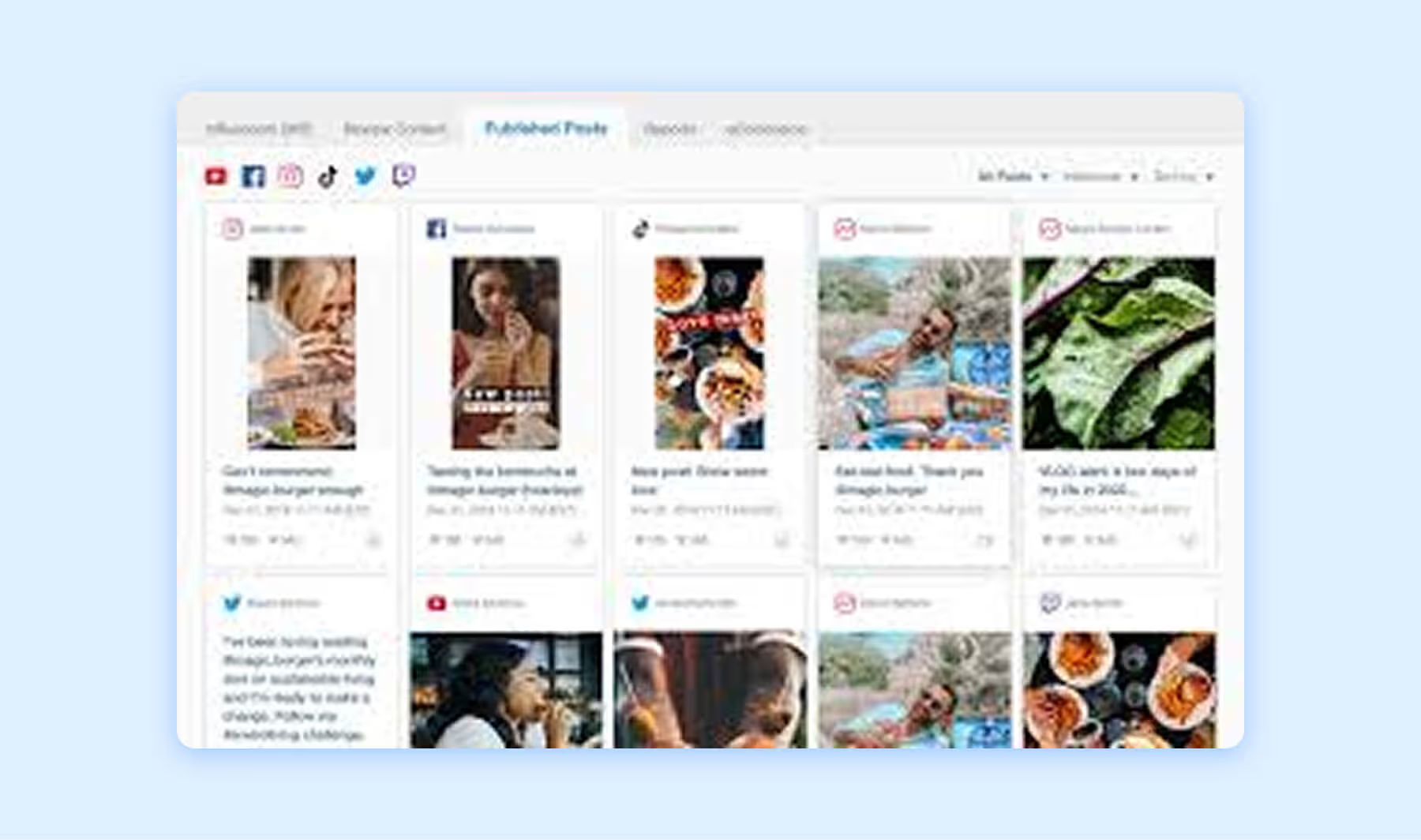
Published social media posts displayed in a grid format across multiple platforms like Instagram and TikTok
Key Features:
- Influencer identification
- Creator analytics
- Social measurement
Best Suited For: Media and Entertainment
Price Range: Not public
14. Sprout Social Influencer Marketing
Sprout Social Influencer Marketing (rebranded from Tagger) offers an AI-powered influencer platform that helps brands discover, vet, and activate influencers using natural-language search, brand-fit scoring, and customizable brand safety features. The platform offers centralized management for campaign workflows that helps brands build authentic partnerships, enhance overall efficiency, and maximize ROI across all influencer relationships.
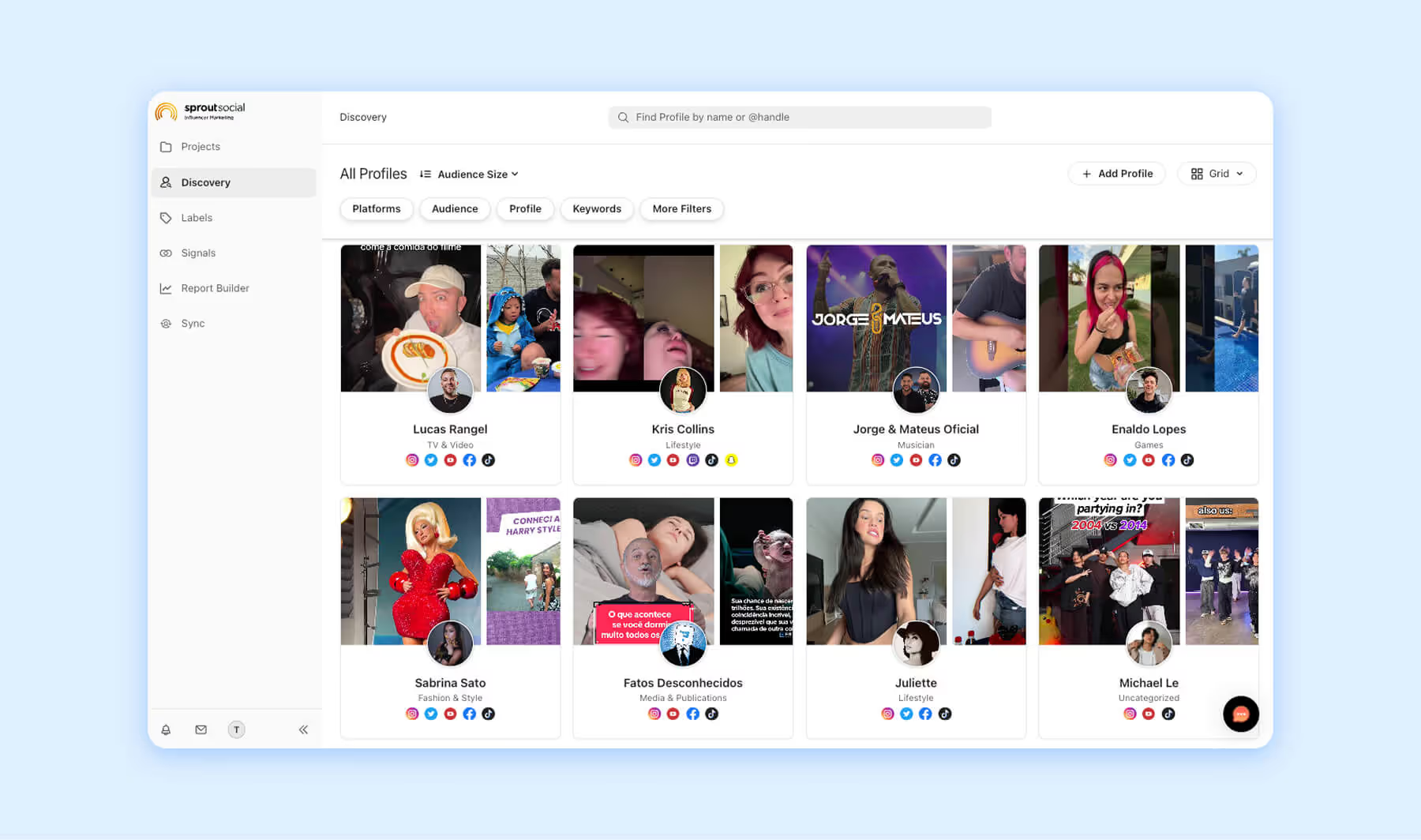
Sprout Social influencer discovery dashboard displaying profile previews and platform icons
Key Features:
- Audience analysis
- Influencer segmentation
- Reporting and dashboards
Best Suited For: Marketing and Technology
Price Range: Not public
15. CreatorIQ
CreatorIQ is a sophisticated, enterprise-grade influencer marketing platform that leverages AI to help brands discover and filter through over 1 billion public social accounts, and 15 million creator profiles. CreatorIQ is built to assist brands in finding relevant, high-quality influencers, and combines a branded, private influencer CRM to streamline campaigns, detect fraud, and offer real-time, robust reporting. Users specifically praise the platform's custom dashboards and competitive benchmarking. Organizations who are interested in CreatorIQ’s functions but aren’t quite large enough to justify the spend should explore CreatorIQ alternatives.
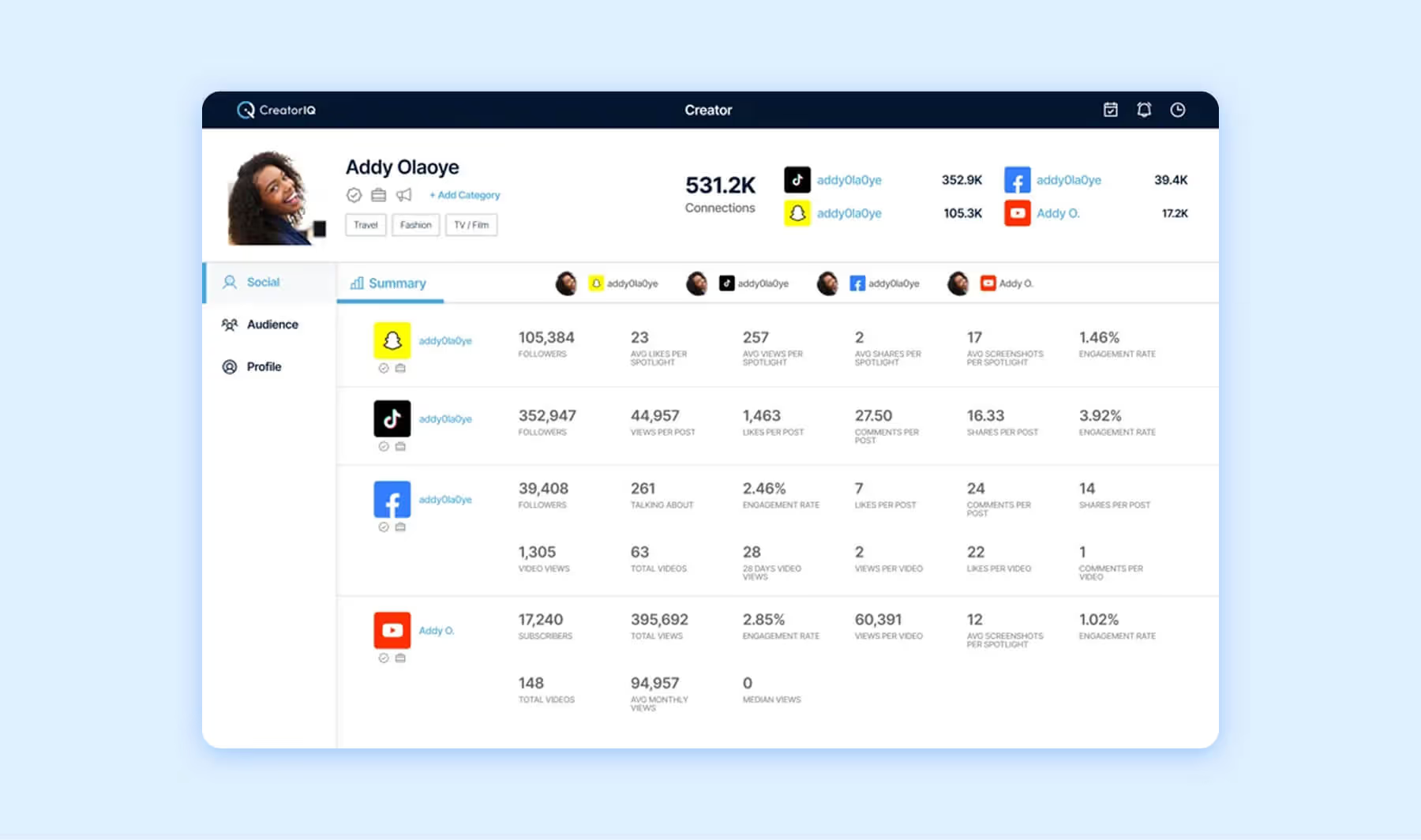
Key Features:
- Campaign analytics
- Data importing and exporting
- Audience analysis
Best Suited For: Enterprise, CPG and Wellness
Price Range: Not public
16. Afluencer
Afluencer is an accessible influencer marketing platform that works to connect brands with influencers across all of the most popular social media platforms for no or low cost. Within the platform, brands can post collaboration opportunities, search via filters, message influencers directly, and even manage campaigns once they get started. Users love the affordability of Afluencer, its integration with Shopify, and communication and support resources.

Key Features:
- Influencer collaboration
- Influencer scoring
- E-commerce integration
Best Suited For: Small Businesses and Travel
Price Range: Free-Premium plans
Social media performance report showing global campaign metrics including reach, impressions, and EMV
17. Skeepers
Skeepers is an AI-powered influencer marketing solution that enables brands to engage with micro and nano-influencers to generate authentic, high-quality content, and reviews. This platform aims to help brands boost visibility and drive conversions with real-time performance tracking, seamless content repurposing, shoppable content integration on product pages, and even live shopping capabilities.
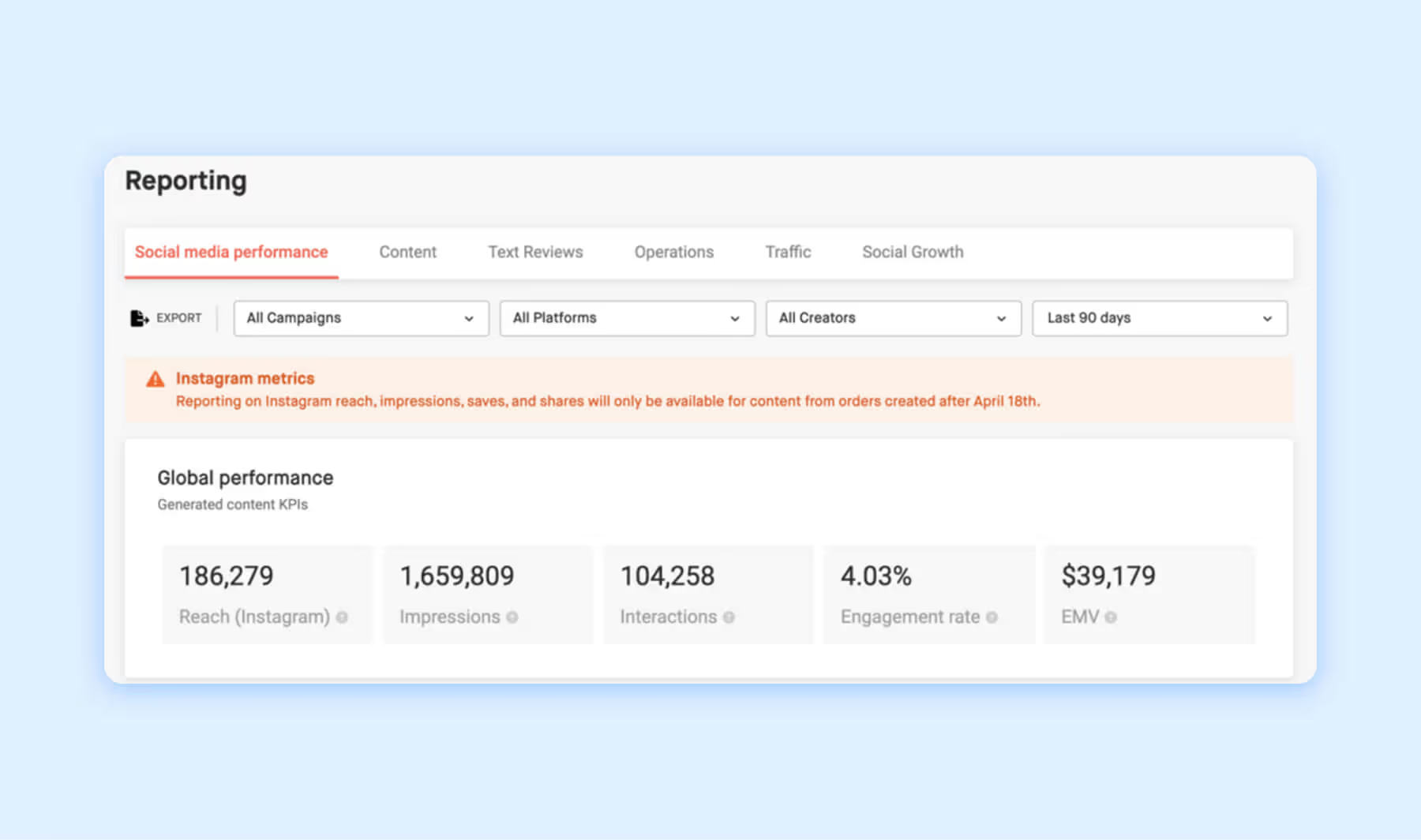
Key Features:
- UGC management
- Influencer collaboration
- Campaign analytics
Best Suited For: Beauty and Fashion
Price Range: Not public
18. Heepsy
Heepsy is an all-in-one influencer marketing platform that lets brands search, filter, select, and collaborate with millions of influencers across the world. The platform provides brands with thorough analytics, including demographic insights, engagement trends, and even fake follower detection technology. Heepsy works to streamline the more manual tasks that come with outreach and campaign management, like messaging, media and content creation, and performance tracking.

Key Features:
- Influencer recruitment
- Influencer scoring
- Data importing and exporting
Best Suited For: Food and Beverage
Price Range: Free-$369 per month
19. Webfluential
Webfluential facilitates authentic creator and brand partnerships through a quality-tested pool of influencers. Brands can use Webfluential to discover influencers, book their time, and manage campaigns all in one place. Something that sets Webfluential apart from other influencer marketing platforms is that it incentivizes both brands and creators with scalable pricing, making it an accessible choice for brands of all sizes.

Key Features:
- Influencer database
- Campaign management
- Influencer scoring
Best Suited For: Enterprise and CPG
Price Range: Not public
20. Traackr
Traackr is a data-driven influencer marketing platform that empowers brands to discover, manage, and measure influencer impact at scale. The platform gives access to millions of creators with years of historical data that brands can filter by advanced requirements like relevance, reach and resonance. Traackr also offers campaign workflow tools, social commerce tracking, and competitive benchmarking, all of which allow brands to make influencer investment decisions with precision.

Key Features:
- Audience analysis
- Campaign analytics
- Reporting and dashboards
Best Suited For: Beauty and Technology
Price Range: Starts at $32,500 per year
6 Benefits of an Influencer Marketing Platform
If it’s not already clear after deep diving into some of the best influencer marketing platforms in this business, they come with many benefits beyond your standard sourcing. Here are six benefits your brand can start enjoying almost immediately after investing in one.
1. Find the Right Creators Faster
Yes, influencer platforms help you find creators, but what makes them really special is the speed at which they can find influencers for any campaign. Sourcing the right influencer manually can take days or even weeks of sorting through content, hashtags, and UGC, but with a specialized platform, those manual tasks are essentially erased. You can set parameters to find a plethora of influencers who fit your exact criteria in literal seconds as opposed to hours.
2. Spot Fake Followers and Protect Your Brand
The great thing about influencer platforms is that they have already done the vetting to ensure creators are legit. So often, people buy followers to inflate their numbers, which can mislead brands into thinking that they’ve built a great community or have amazing engagement. Influencer platforms weed out those types of creators to guarantee that you’re only finding influencers that can truly deliver results.
3. Manage Campaigns in One Place
Odds are, you have multiple different campaigns (creator and not) on the go. Having one centralized platform where you can switch between performance in one click is not just a ‘nice to have’, it’s a necessity. Not only does it simplify workflow, but it also allows you to actively benchmark campaigns against each other.
4. See Influencer Stats and Track Results As You Go
This is where a great influencer platform goes above and beyond. Upon opening the platform, you’ll be greeted with performance indicators that tell you immediately how your creators are performing. There’s no guesswork, just cold, hard data compared directly with your benchmarks and goals. This makes tracking results as you go seamless and actually an enjoyable experience.
5. Handle Payments and Contracts Easily
Managing contracts and payments is one of the more challenging elements of influencer marketing. Luckily, influencer platforms make this super easy by housing contracts directly in the product, allowing you to update any payment information in a few easy clicks and, of course, storing all your conversations with your creators so there is always a paper trail in relation to your agreement.
6. Get Clear Reports on Performance and Improve Campaigns
Beyond day-to-day performance tracking, influencer marketing platforms allow you to dig deeper into your results to truly understand what and who is resonating with your audience. No more sorting through endless pages of data; instead, you can pull reports to cover broad campaign performance or get as granular as you please. These insights can be used to tailor future campaigns with and without influencers.
How To Choose the Best Influencer Marketing Platform for Your Brand
Not all influencer marketing platforms are created equally. This makes it especially difficult to choose the right one, especially when they’re all telling you they can do the same thing but in different words. Here are a few important factors to consider when choosing an influencer platform that can help you narrow down your search and find the best fit for your brand.
Know Your Campaign Goals and Set Your Budget
You can’t go into an influencer platform blind. You have to have solid goals for what this tool will help you achieve and, even more importantly, a marketing budget. As you probably noticed above, the prices of these tools vary widely (if they’re even publicly available), meaning it’s crucial you set a budget before taking the next step to avoid being sold on a tool that is just not in your price range.
Read Reviews and Case Studies
Peer reviews will be some of the most helpful information you can find in relation to influencer platforms. You want to look for reviews from social media managers or influencer managers and case studies from brands that have a similar company size to you, common goals or even a crossover in target audience. These reviews and stories will give you real insight into how this tool will work for you.
Consider Integration With Your Existing Tools
Every social media or marketing team has a full roster of tools they use daily, and it needs to be a deal breaker if your influencer platform doesn’t integrate with those tools. Integration is so important because the entire purpose of your influencer platform should be to make your life easier, not more difficult, and having tools that complement each other is a must.
Take Advantage of Free Trials or Demos
There’s nothing better than getting to try before you buy. Many influencer platforms allow you to try out the product for a few days or weeks (no strings or financials attached) making it crystal clear whether it’s a good fit for you. We recommend trying out a couple different platforms either at the same time or one after the other to be able to accurately compare what works and what doesn’t.
Influencer Marketing Platform FAQs
Why do you need an influencer marketing platform?
Influencer marketing platforms are important, and some might even say they're indispensable to a brand’s social media marketing strategy. Brands that don’t work with influencers risk missing out on these ultra-engaged audiences. They also risk losing their share of voice and market share to their peers, who are likely tapping into brand ambassadors and influencer partnerships.
How do brands find the right influencers for their campaigns?
You can easily find the right influencers for your campaigns using an influencer platform that allows you to filter creators based on exactly what you need. If you don’t have access to a specific influencer platform, you can source creators using UGC, hashtag or competitive research to see who’s already posting about your campaign topic.
What is the best platform to find influencers?
Some of the best platforms for finding influencers include Dash Social, Influencity, Upfluence, and GRIN. These platforms are built to make it easy to find the perfect influencers and partnerships.
How do pricing models differ among top influencer marketing platforms?
Pricing is completely different from platform to platform. Some platforms offer a free option or a small monthly charge ($5-$20), but these are usually more limited and don’t necessarily give you access to the types of influencers you need. Other platforms come at a higher cost ($400-$1000+ per month), but that is usually reflected in the quality of the platform and what it offers in addition to influencer marketing.






